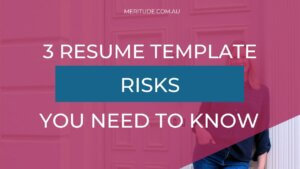You got the interview, and it seemed to go well. The interviewer says, “We just need to check your references and we’ll get back to you.” But the next time you talk to the interviewer, there’s a different tone — they “decided to go another direction.”
Uh-oh, there may be a problem with your references.
If you left your most recent company on bad terms, this might not be a surprise. But what if you recently left a company where you had a new supervisor who didn’t know you well? What will he — or she — say about you?
Are your references sabotaging your job search?
It’s vital carefully consider who you provide as a reference to a prospective employer. Assuming you are given the opportunity to submit names for the reference check, even a “friendly” reference may unintentionally create problems for you.
A 2010 Society for Human Resource Management (SHRM) survey found 76 percent of organisations conduct reference background checks for all job candidates. The survey defined “reference background checks” as verification of information provided by a job applicant or communication with people regarding the job applicant. This statistic did not include credit and criminal background checks. Prospective employers generally contact 2-3 references for each job candidate.
Reference checks are particularly common in some professions, including science, legal, healthcare, technology, operations, and customer service roles.
According to reference checking companies, nearly half of all reference checks result in a negative outcome. This is particularly true when you are paying to have your references checked because you’re more likely to have issues that would result in a negative reference check.
But isn’t it better to know if your references are causing you problems, instead of just wondering?
Unlike a background check or credit check, there is no central “department” for companies to tap into to obtain the information easily. So, companies must conduct reference checks with individuals who can provide valid information about you as a candidate.
If you suspect a previous employer may be a problem, one way to protect yourself is a pre-interview reference check.
To do this, you have 2 options
- Enlist the help of a friend, colleague or family member
- Engage a professional reference check agency
Friends, Family & Colleagues
You could have a friend, family member, or colleague call and pretend to be a hiring manager.
Clearly, this is a free option and could be a reasonable first step to gauge if your contact is sabotaging your job search efforts.
However, if you choose to go down this path consider the following:
- Will your friend, family member or colleague be diligent and persistent in trying to get hold of your referee?
- Will they be using a “blocked number”? Private numbers on caller ID can be suspicious and your reference may not answer.
- Does your contact have time to handle returned phone calls? Your reference might return phone call the call at an inconvenient time, potentially giving away that you’re checking your references.
- What questions will be asked? A friend may ask illegal questions inadvertently or allow something to “slip” during the conversation. Professional reference checking services know the law and will protect your confidentiality.
- Are you considering recording the call? Be aware it can be illegal to record conversations without the agreement of both parties — you don’t want your friend to be sued if they don’t know the law.
Reference Check Company
Reference check companies are trained in techniques to elicit possible negative information, including reading nonverbal or subtle verbal cues. You’ll also receive details of the reference check in writing, in case you need to pursue legal action.
If they uncover damaging information, you may find it’s better to have a third party involved in order to be able to provide legally admissible information. Some services will provide certified reports and sworn affidavits for this purpose for an additional fee.
How A Reference Checking Service Works?
You provide them with the contact information of one or more possible references, arrange payment (ranging from $30 to $100 per reference), and they will make contact.
It can take anywhere from one day to several weeks to receive your report(s), depending on how difficult — or easy — it is to track down the contacts. Most professional reference checking companies will attempt between 4-6 contacts, leaving messages each time requesting a return phone call to check a reference.
The reference checker represents himself or herself as a reference checking service on behalf of an unnamed prospective employer, so the person who is being questioned as a reference won’t know you hired a service.
Common questions that are asked by the reference checking service include:
- Verification that you worked for the company
- Your job title and role with the company
- Employment beginning and end dates
- Pay rate
- Evaluation of key performance attributes
- Reason for separation/leaving the company
- Eligibility for rehire by the company
- Recommendation for hire by the prospective employer
Higher-level packages also often include:
- Additional performance attributes
- Collecting information about accomplishments
- Evaluation of leadership/problem-solving capabilities
Most services will provide verbatim quotes from the reference as part of the written report.
Things To Consider When Hiring a Reference Checking Company
- Review the company’s cancellation/substitution policies carefully. If the reference you provide does not return phone calls and cannot be contacted, you probably won’t receive a refund. There are many reasons why a reference may not be able to be contacted, including illness, holiday’s, or business travel. Or he or she may simply not want to provide a reference and, consequently, be unavailable for contact.
- Ask the company about callbacks. If the service you choose does not provide employment verification services for corporate clients, make sure the callback number they are using does not appear in Google search results as a third-party reference checking service; otherwise, the reference may discover you’re investigating him or her, leading to future negative references, even if he or she would have provided a positive one previously.
- Check the company’s confidentiality policy. If challenged by the reference about “who is asking,” most reference checking companies will represent themselves as an independent third-party verification service conducting a reference check. In general, the companies won’t misrepresent themselves as an actual prospective employer if they are asked.
What Can You Do If You Get a Bad Reference?
If you’ve been involved in a lawsuit in your previous job, this may affect your future employment, depending on what your former employer says about you. Even if you left on good terms, you may find you’re getting a less-than-stellar reference. So, what should you do if you find your references are hurting your employment prospects?
It depends on the type of negative information that is uncovered. Common issues include:
- Inaccurate information
- Badmouthing
- Discrimination
Inaccurate information is the easiest to correct. If you’re being bad-mouthed, you may have to get legal advice for how to handle it.
While it’s not always possible to keep a prospective employer from talking to a bad reference, if you can, send prospective employers to a different reference who can also speak to your experience at that company, but with a more positive attitude.
What’s Next in Reference Checking?
Some job seekers are using professional reference checks to their advantage in the job search, presenting pre-checked references as part of the interview process. Presenting a written report of your references, validated by a third-party service, can reassure a prospective employer.
This is even more powerful when the references are checked again, and the same information is discovered in the company’s own reference check.
If you find you’re getting interviews, but not job offers, your references might be the problem.
A third-party reference checking service can help you identify whether this is the case, and give you the information you need to decide how to proceed. If your references are providing glowing testimonials of your employment, knowing that can also boost your confidence, and potentially give you a tool that you can use to strengthen your candidacy.





